Abstract
Although widely studied, the residential water demand remains a controversial issue. The purpose of the current study is to investigate systematic variations across related studies using meta-analysis approach. Particularly, a meta-analytical regression is performed to assess the sensitivity of the price, income and household size elasticities to a number of characteristics including demand specification, data characteristics, price specification, tariff structure, functional form, estimation technique and location of demand. The empirical results of the study reveal that these characteristics have differing influence on the reported elasticities. Obviously, these findings lie in their importance for regulators and policy makers and for academics alike. Among others, two important conclusions emerge. First, water use in summer and winter seasons and water use for indoor and outdoor purposes are found to be important factors affecting the price elasticity. This suggests that peak-load water pricing may be an effective tool for managing water demand. Second, the three elasticities tend to be differently estimated across various regions of the world as well as between developed and developing countries. Therefore, decision makers in a given country would not rely on the findings of studies conducted on other countries in formulating their policies.



Similar content being viewed by others
Notes
Due to limited space, the complete list of studies used in this meta-analysis is not provided here but is available upon request from the author.
Evidently, the income and household size are not controlled for in the two meta-regressions of the income and household size elasticities, respectively.
The Shin price specification is used to address the price perception issue. Shin (1985) introduced a price-perception parameter to test whether consumers respond to average price, marginal price, or a combination of the two. Different values of this parameter, combined with different rate structures, yield different theoretical results about the ordering of perceived, marginal, and average price values (Arbués et al. 2003).
The REML is estimated using the Stata’s metareg routine.
Note here that the common approach consists in using the precision (inverse of standard errors) or standard errors on the vertical axis. However, as explained previously, these latter are not available and, therefore, the square root of sample size are used instead. Such a practice is recently adopted by many meta-analysts in constructing the funnel plots, including Delmas et al. (2013) and Dimitropoulos et al. (2011).
Due to the limited number of observations, the meta-regression of the household size elasticity is not estimated by the bootstrap OLS.
References
Arbués, F., Barberán, R., & Villanúa, I. (2004). Price impact on urban residential water demand: A dynamic panel data approach. Water Resources Research, 40(11), W11402(1)–W11402(9).
Arbués, F., García-Valiñas, M. A., & Martínez-Espiñeira, R. (2003). Estimation of residential water demand: A state of the art review. Journal of Socio-Economics, 32(1), 81–102.
Arbués, F., Villanúa, I., & Barberán, R. (2010). Household size and residential water demand: An empirical approach. The Australian Journal of Agricultural and Resource Economics, 54, 61–80.
Asenso-Boadi, F., Peters, T. J., & Coast, J. (2008). Exploring differences in empirical time preference rates for health: An application of meta-regression. Health Economics, 17, 235–248.
Ashenfelter, O., Harmon, C., & Oosterbeek, H. (1999). A review of estimates of the schooling/earnings relationship, with tests for publication bias. Labour Economics, 6, 453–470.
Barberán, R., & Arbués, F. (2009). Equity in domestic water rates design. Water Resources Management, 23, 2101–2118.
Benos, N., & Zotou, S. (2013). Education and economic growth: A meta-regression analysis. MPRA working paper No 46143.
Brander, L. M., Van Beukering, P., & Cesar, H. S. J. (2007). The recreational value of coral reefs: A meta-analysis. Ecological Economics, 63, 209–218.
Brons, M., Pels, E., Nijkamp, P., & Rietveld, P. (2002). Price elasticities of demand for passenger air travel: A meta-analysis. Journal of Air Transport Management, 8, 165–175.
Dalhuisen, J. M., Florax, R. J. G. M., de Groot, H. L. F., & Nijkamp, P. (2003). Price and income elasticities of residential water demand: A meta-analysis. Land Economics, 79, 292–308.
Day, B. (1999). A meta-analysis of wage-risk estimates of the value of statistical life. Centre for social and economic research on the global environment, University College London, mimeo.
de Blaeij, A., Florax, R. J. G. M., Rietveld, P., & Verhoef, E. T. (2003). The value of statistical life in road safety: A meta-analysis. Accident Analysis and Prevention, 35, 973–986.
Delmas, M. A., Fischlein, M., & Asensio, O. I. (2013). Information strategies and energy conservation behavior: A meta-analysis of experimental studies from 1975 to 2012. Energy Policy, 61, 729–739.
Dimitropoulos, A., Rietveld, P., & van Ommeren, J. N. (2011). Consumer valuation of driving range: A meta-analysis. Tinbergen Institute Discussion Paper 133/3.
Espey, J. A., & Espey, M. (2004). Turning on the lights: A meta-analysis of residential electricity demand elasticities. Journal of Agricultural and Applied Economics, 36(1), 65–81.
Espey, M., Espey, J., & Shaw, W. D. (1997). Price elasticity of residential demand for water: A meta-analysis. Water Resources Research, 33(6), 1369–1374.
Florax, R. (2001). Methodological pitfalls in meta-analysis: Publication bias. Serie Research Memoranda 0028, VU University Amsterdam, Faculty of Economics, Business Administration and Econometrics.
Gallet, C. A. (2010). The income elasticity of meat: A meta-analysis. The Australian Journal of Agricultural and Resource Economics, 54, 477–490.
Harbord, R. M., Harris, R. J., & Sterne, J. A. C. (2009). Updated tests for small-study effects in meta-analyses. The Stata Journal, 9(2), 197–210.
Lindhjem, H. (2007). 20 years of stated preference valuation of non-timber benefits from Fennoscandian forests: A meta-analysis. Journal of Forest Economics, 12, 251–277.
Loomis, J. B., & White, D. S. (1996). Economic benefits of rare and endangered species: Summary and meta-Analysis. Ecological Economics, 18, 197–206.
Martínez-Espiñeira, R. (2003). Estimating water demand under increasing block tariffs using aggregate data and proportions of users per block. Environmental & Resource Economics, 26(1), 5–23.
Miyawaki, K., Omori, Y., & Hibiki, A. (2011). Panel data analysis of Japanese residential water demand using a discrete/continuous choice approach. The Journal of Japanese Economic Association, 62, 417–421.
Mu, X., Whittington, D., & Briscoe, J. (1990). Modeling village water demand behavior: A discrete choice approach. Water Resources Research, 26(4), 521–529.
Mulatu, A., Florax, R., & Whithagen, C. A. (2003). Environmental regulation and competitiveness: An exploratory meta-analysis. In A. Läschel (Ed.), Empirical modeling of the economy and the environment (pp. 23–54). Berlin: Springer.
Nauges, C., & Whittington, D. (2010). Estimation of water demand in developing countries: An overview. World Bank Research Observer, 25(2), 263–294.
Nelson, J. P. (2004). Meta-analysis of airport noise and hedonic property values: Problems and prospects. Journal of Transport Economics and Policy, 38, 1–28.
Nelson, J. P. (2011). Alcohol marketing, adolescent drinking and publication bias in longitudinal studies: A critical survey using meta-analysis. Journal of Economic Surveys, 25(2), 191–232.
Nelson, J. P., & Kennedy, P. E. (2009). The use (and abuse) of meta-analysis in environmental and natural resource economics: An assessment. Environmental & Resource Economics, 42, 345–377.
Olmstead, S. M. (2009). Reduced-form versus structural models of water demand under non-linear prices. Journal of Business and Economic Statistics, 87(1), 84–94.
Rosenberger, R., & Loomis, J. B. (2000). Using meta-analysis for benefit transfer: In sample convergent validity tests for outdoor recreation database. Water Resources Research, 36, 1097–1107.
Rosenthal, R. (1979). The “File drawer problem” and tolerance for null results. Psychological Bulletin, 86(3), 638–641.
Scheierling, S. M. (2006). Irrigation water demand: A meta-analysis of price elasticities. Water Resources Research, 42, W01411.
Sebri, M. (2013). Intergovernorate disparities in residential water demand in Tunisia: A discrete/continuous choice approach. Journal of Environmental Planning and Management, 56(8), 1192–1211.
Shin, J. S. (1985). Perception of price when information is costly: Evidence from residential electricity demand. Review of Economics and Statistics, 67(4), 591–598.
Stanley, T. D., & Doucouliagos, H. (2012). Meta-regression analysis in economics and business. London: Routledge.
Stanley, T. D., & Doucouliagos, H. (2013). Neither fixed nor random: Weighted least squares meta-analysis. School working paper, Economic Series 2013/1, Deakin University, Australia.
van den Bergh, J. C., & Button, K. J. (1997). Meta-analysis of environmental issues in regional, urban and transport economics. Urban Studies, 34, 927–944.
van Houtven, G., Powers, J., & Pattanayak, S. K. (2007). Valuing water quality improvements in the United States using meta-analysis: Is the glass half-full or half-empty for national policy analysis. Resource and Energy Economics, 29, 206–228.
Warren, D., & Chen, L. T. (2013). The relationship between public service motivation and performance. In E. Ringquist (Ed.), Meta-analysis for public management and policy (pp. 442–473). London: Wiley.
Worthington, A. C., & Hoffman, M. (2008). An empirical survey of residential water demand modeling. Journal of Economic Surveys, 22(5), 842–871.
Zamparini, L., & Reggiani, A. (2007). Meta-analysis and the value of travel time savings: A transatlantic perspective in passenger transport. Networks and Spatial Economics, 7(4), 377–396.
Acknowledgments
The author is very grateful to the Editor D. Pimentel and two anonymous reviewers for their valuable comments and suggestions, which have helped improve the paper considerably.
Author information
Authors and Affiliations
Corresponding author
Rights and permissions
About this article
Cite this article
Sebri, M. A meta-analysis of residential water demand studies. Environ Dev Sustain 16, 499–520 (2014). https://doi.org/10.1007/s10668-013-9490-9
Received:
Accepted:
Published:
Issue Date:
DOI: https://doi.org/10.1007/s10668-013-9490-9




